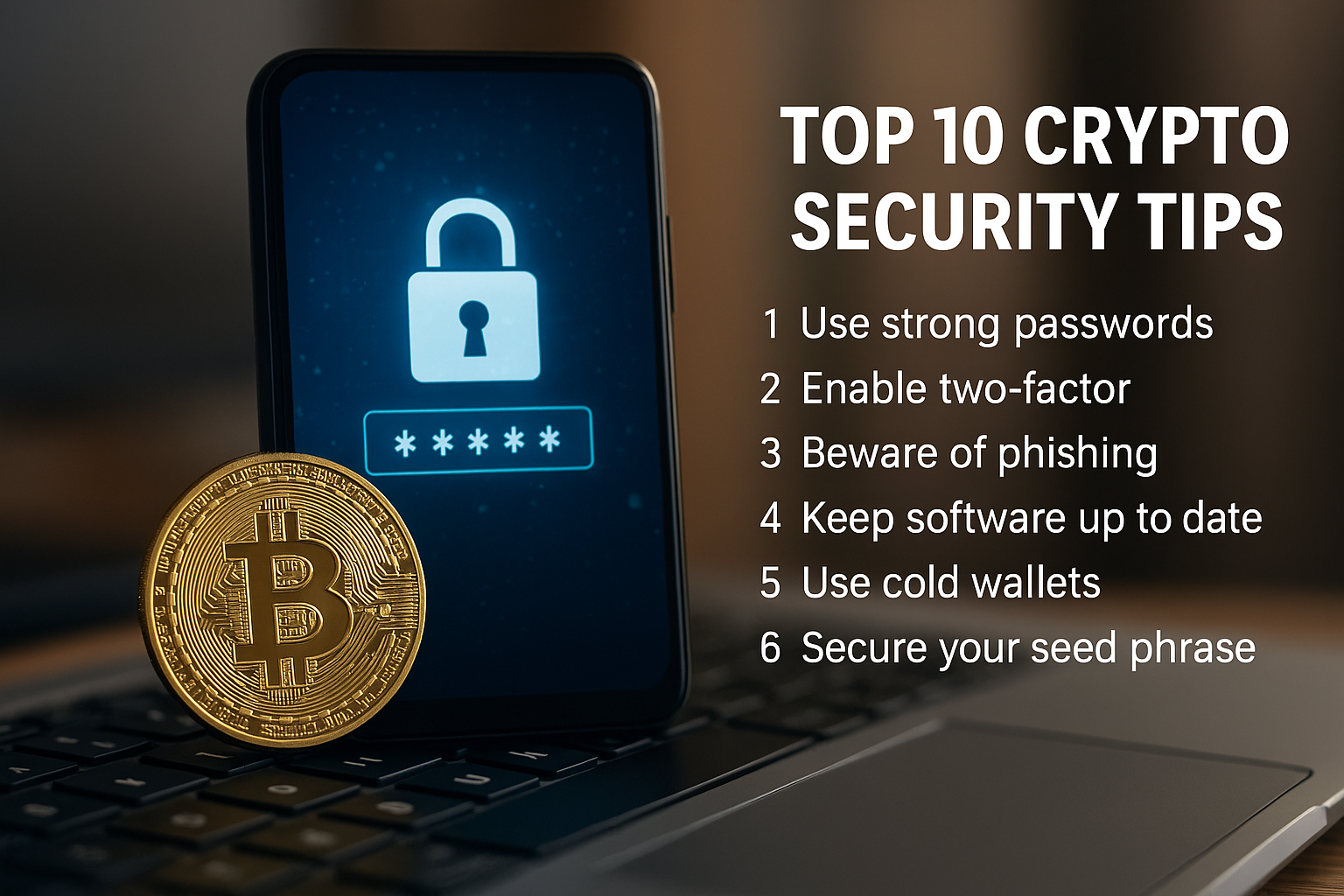Top 10 Crypto Security Tips Every Investor Must Know in 2025

In 2025, the crypto space is more exciting—and more dangerous—than ever. With growing adoption, AI-driven altcoins, and massive global investments, crypto is becoming mainstream. But with the rise of decentralized finance (DeFi), non-custodial wallets, and blockchain anonymity also comes a sharp spike in scams, hacks, and cyberattacks.
If you’ve ever thought, “How secure is my password?”, wondered “Is Temu safe?”, or Googled a password checker to assess your security, you're not alone. And when it comes to crypto, even one small mistake could cost you your entire portfolio.
So let’s break down the top 10 crypto security tips that every investor must know in 2025 — whether you're HODLing Bitcoin or riding the next altcoin wave.
1. 🔐 Use Strong, Unique Passwords for Every Crypto Platform
Keyword: How secure is my password
Your password is your first line of defense. If you're using the same password for your email and your exchange — you're asking for trouble.
Use long, random, and unique passwords for each crypto app, wallet, and email.
Consider using a password manager (like 1Password or Bitwarden).
Test your existing password strength on a trusted password checker tool (never on shady sites).
👉 Tip: Don’t save crypto-related passwords on cloud notes or browsers.
2. 🔍 Always Double-Check URLs and App Authenticity
Keyword: Is Temu safe?
Just like Temu scams exist in shopping, phishing websites and fake wallet apps are on the rise in crypto too.
Only download apps from official websites or verified app stores.
Bookmark your crypto platforms (like exchanges and wallets).
Avoid clicking on links from unknown Telegram groups, Twitter replies, or Discord messages.
3. 🧠 Enable Two-Factor Authentication (2FA) Everywhere
This one’s non-negotiable.
Use authenticator apps like Google Authenticator or Authy (not SMS).
Enable 2FA for email, exchange accounts, wallet apps, and hardware wallet backups.
Consider using hardware keys like YubiKey for high-value accounts.
4. 🏠 Store Seed Phrases Offline
Seed phrases (your 12 or 24-word recovery phrase) = full access to your crypto.
Never store it digitally (screenshots, emails, WhatsApp — NO).
Write it on paper and keep it in a fireproof safe or multiple hidden locations.
For extra security, use metal seed storage plates.
5. 💼 Use Cold Wallets for Large Funds
Online (hot) wallets like MetaMask are great for daily use, but they're connected to the internet, and that’s risky.
For holding large sums, use hardware wallets like Ledger or Trezor.
Keep your cold wallet completely offline.
Back up the wallet's seed phrase securely.
6. 🌐 Use the Best VPN for P2P and Exchange Access
Keyword: best VPN for P2P
Many exchanges block access in certain countries or regions. VPNs not only help with access but also improve privacy.
Use a VPN that supports no-logs and P2P (e.g., NordVPN, ProtonVPN).
Use it while accessing exchanges, wallets, or DApps.
Avoid public Wi-Fi when dealing with crypto transactions.
7. ⚠️ Be Wary of Airdrops, Free Token Offers & Phishing DApps
If it sounds too good to be true, it probably is.
Many scam DApps mimic real ones and steal wallet access when connected.
Avoid “free airdrops” that ask for your seed phrase.
Use sites like Revoke cash to revoke unnecessary token approvals.
8. 🧾 Don’t Overshare Portfolio Details
Talking about your holdings is a security risk.
Never share wallet screenshots, QR codes, or token balances online.
Social engineering attacks often start by targeting people with public profiles.
Be discreet, especially on Twitter, Telegram, or Discord.
9. 🔄 Keep Software and Firmware Updated
Outdated apps, wallets, or firmware can become security liabilities.
Regularly update your wallet software, browser extensions, and mobile apps.
Check official sources (never random download links).
Update the hardware wallet firmware to patch vulnerabilities.
10. 📚 Educate Yourself Continuously
Crypto security isn’t a one-time setup — it’s ongoing.
Follow reputable sources like CoinDesk, Decrypt, and Cointelegraph.
Join communities that share updates on scams and exploits.
Subscribe to newsletters that focus on crypto threats and best practices.
🔍 People Also Ask
Which crypto has the best future for 2025?
Ethereum, AI-integrated coins like Fetch.AI, and tokens with strong real-world utility are gaining traction. But always DYOR (Do Your Own Research).
What will happen to cryptocurrency in 2025?
Mainstream adoption is rising, but regulation is catching up. Expect safer platforms, more KYC requirements, and continued volatility.
What is the best security for crypto?
A combination of cold wallets, 2FA, VPNs, and solid password security gives the best protection. Diversify your defenses.
⚠️ Disclaimer
This blog is for informational purposes only and does not constitute financial or investment advice. Cryptocurrency is volatile and carries significant risk. Always consult a licensed financial advisor and conduct your own research before making decisions.
🧠 Conclusion
Crypto is one of the most rewarding financial frontiers — but it comes with serious risks. Whether you’re buying your first NFT, trading live Bitcoin, or holding Ethereum long-term, your personal security habits could be the difference between profit and loss.
Following the above crypto security tips will help you navigate 2025's rapidly evolving landscape like a pro — and protect your assets while others get rekt.